 Database
Database
 Mysql Tutorial
Mysql Tutorial
 Logical backup and point-in-time restore in MySQL based on mysqldump and binary log log-bin
Logical backup and point-in-time restore in MySQL based on mysqldump and binary log log-bin
Logical backup and point-in-time restore in MySQL based on mysqldump and binary log log-bin
Source of this article:
This article only simulates the use of mysqldump and log-bin binary logs for simple testing, and is only used as personal study notes , which may still be far from practical application, and is only for reference.
Enable MySQL's bin-log binary log
Simulated restore requires the files and log-bin from mysqldump, so you need to start log- bin binary log.
When opening the binary log in mysql5.7.18, in addition to setting the location of log-bin, you also need to set a server-id. Previous versions of MySQL should not require this setting.
Let’s complain about open source software. Basically, each version has some differences from the previous version. It is often difficult to search for information online. Many things are different in different versions. This One thing to note.

After restarting, query the variables related to log_bin

mysqldump backup ( The basic use of export) data
Mysqldump command parameters are quite many. Let’s briefly record the commonly used commands, and use mysqldump backup (strictly speaking, export data) and binary log log-bin to perform database restoration operations.
-- Back up the entire testdb database, -l means add a read lock to all tables, -F (F must be uppercase, lowercase does not report an error and a single page is invalid) means rolling to generate a new log file
mysqldump -u root -p -l -F -h localhost testdb > usr/local/mysqlbak/test20170607_data.sql

The backed up file is create table And the script of insert into table
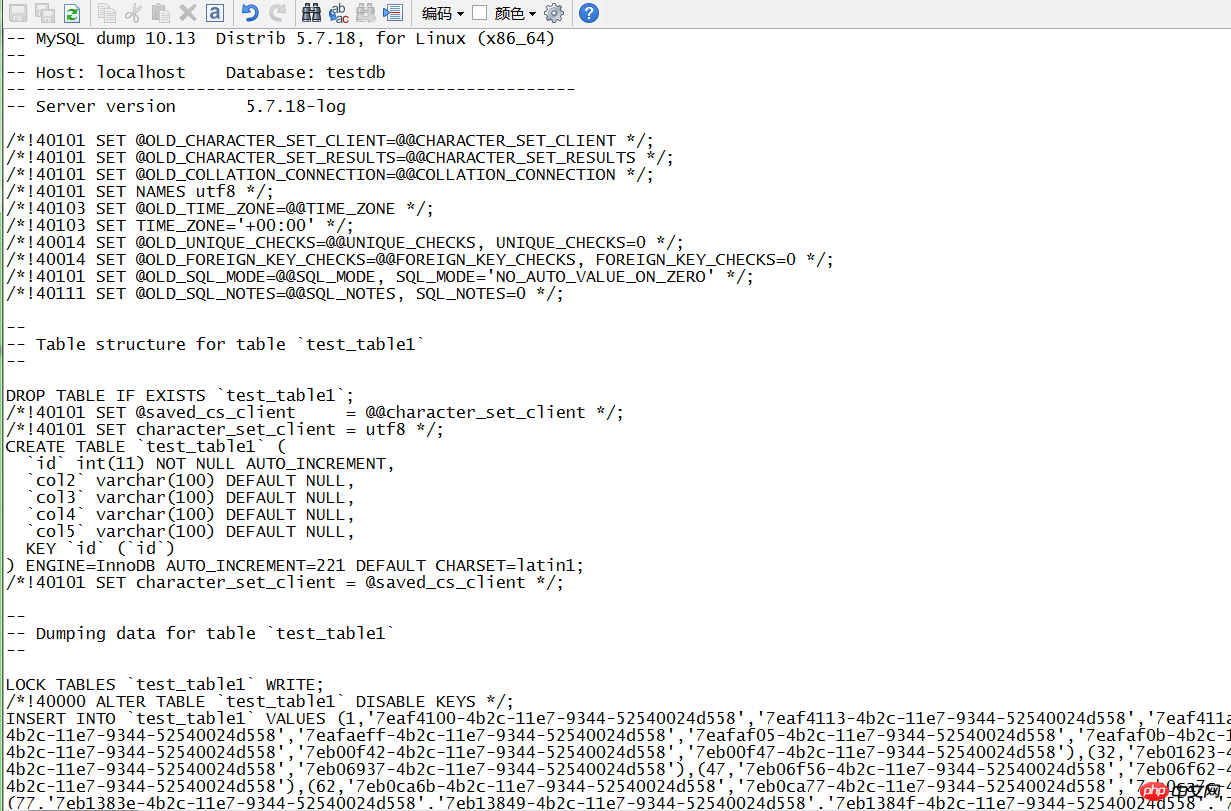
--Back up the two tables test_table1 test_table2 in the testdb database, adding --no-create-info means this backed up file The script without create table is just the information of insert into table
mysqldump -uroot -p -h localhost testdb test_table1 test_table2 --no-create-info> usr/local/mysqlbak/test20170606_1. sql
-- Back up part of the data in the test2 table in the testdb database, that is, back up the data in the test_table1 table that matches id<1000
mysqldump -uroot -p -h localhost testdb test_table1 - -where "id<1000" > usr/local/mysqlbak/test20170606_2.sql
For more mysqldump parameters, refer to:
In addition, mysql Log-bin replacement strategy:
Use index to cycle files, and will cycle to the next index
1 under the following conditions. Server restart
2. The server was updated
3. The log has reached the maximum log length max_binlog_size
4. The log is flushed mysql> flush logs;
Use the files backed up by mysqldump and the log-bin binary log to restore
First, in the following table Back up if there is data

Execute mysqldump -u root -p -l -F -h localhost testdb --master-data=2 > usr/local/mysqlbak/test20170607_data.sql

An option --master-data=2 is added here to note the current data in the backup file. log_bin file,
As for why this command is added, many blogs record that after using mysqldump to back up a file, modify the data, and then simulate the accidental deletion or downtime restoration of the database, and then use mysqldump to get the result. After the file is restored, then use log-bin to restore
Although they are all test simulations, there is an obvious problem. How do you know whether the log has scrolled after mysqldump and how many times it has scrolled?
If the log is not scrolled, restore the log-bin file according to the time point or position. If it is scrolled, how do you know how many log files have been scrolled?
You need to record it when mysqldump is executed and refresh the log. When using the newly generated log-bin file to restore the log, you can determine which logs to use for restoration.
With the --master-data=2 option, you can know the log_file location during mysqldump backup

Then continue to insert 10 pieces of data into the table
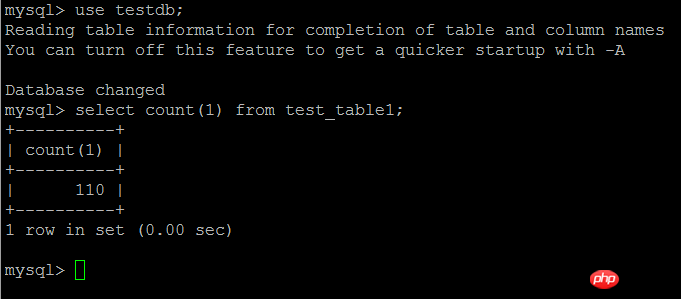
Then simulate the situation of accidentally deleting data at a certain point in time, truncate the test table, and the test table is empty at this time
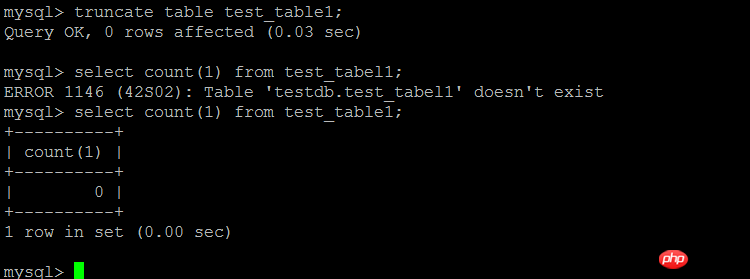
First, use the file from mysqldump to restore the database. The file backup from mysqldump contains 100 rows of data.
Because the data in the backup file at the time of backup is 100 rows, after the restore, it is 100 rows, so there is no problem.
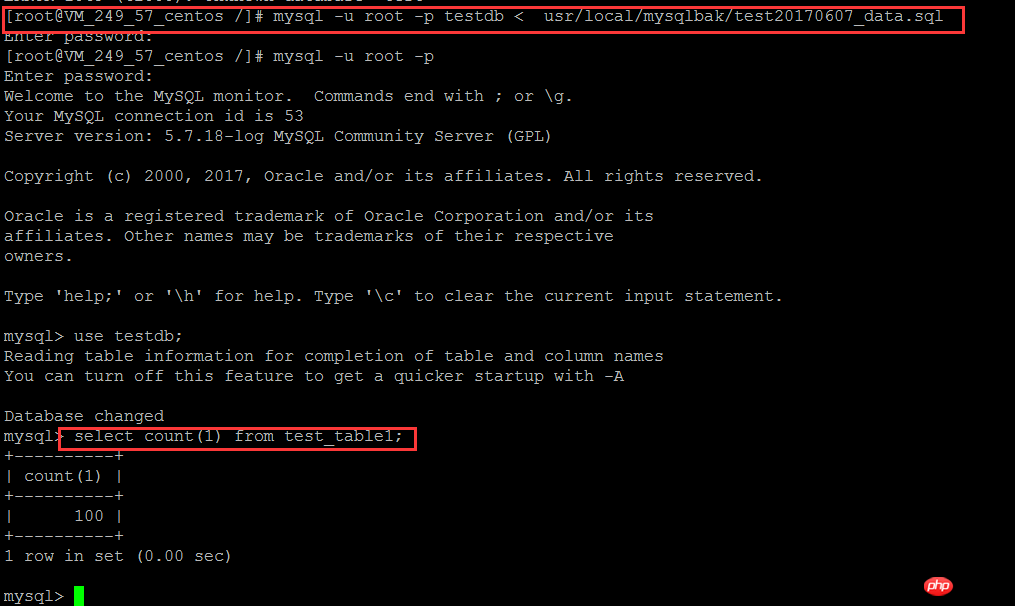
Then use log-bin to restore according to time points. As mentioned above, the file produced by mysqldump records the file name of log-bin after the log is refreshed,
Then you can judge whether the log has scrolled. If it has not scrolled, restore it according to the time point according to the latest log-bin in the figure below.

Perform a mysqldump backup and restore
mysql -u root -p testdb < usr/local/mysqlbak/test20170607_data.sql
Perform then perform another based on Time point restoration of bin-log
Mysqlbinlog --stop-datetime="2017-6-7 21:45:00" /var/lib/mysql/mysql-bin.000022 | mysql -u root -p testdb
Then the data comes back.
Restoration based on time point also needs to find out which log file is based on the time point. 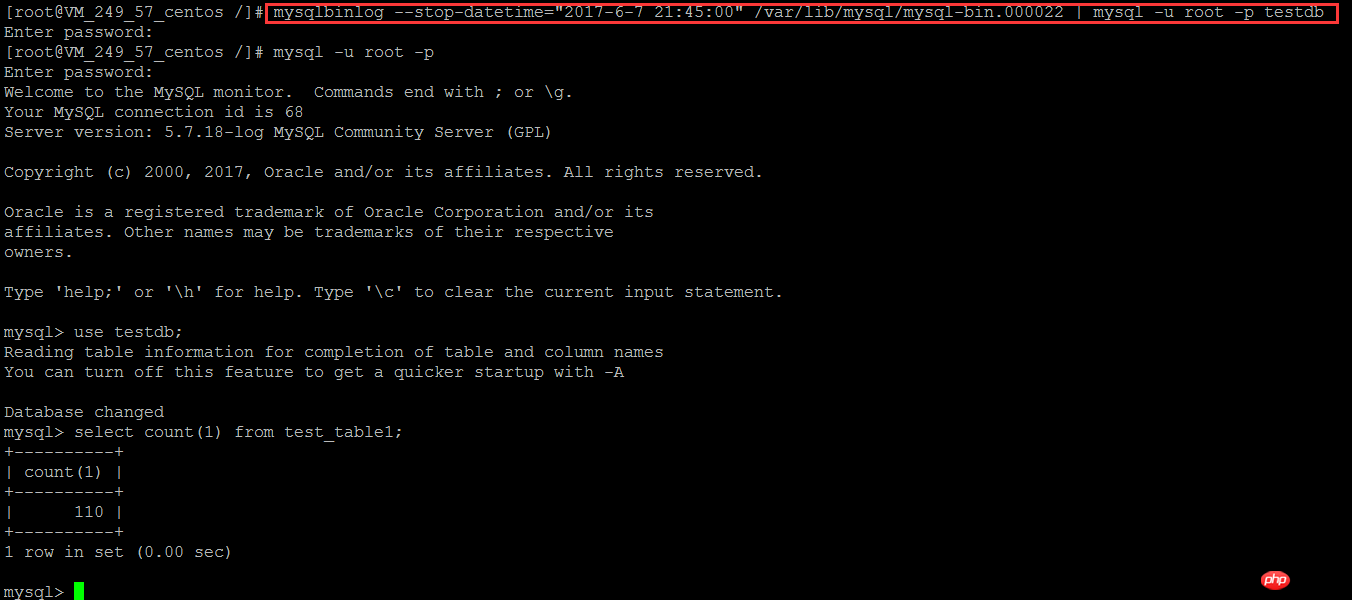
Summary:
This article only uses a simple example to model the restore operation of the database.The mysqldump backup mode is relatively simple and crude. Just exporting the data as an insert script will cause performance problems when restoring larger data. Mysqldump may not be suitable, and a more efficient xtrabackup is needed for backup and restoration.
The above is the detailed content of Logical backup and point-in-time restore in MySQL based on mysqldump and binary log log-bin. For more information, please follow other related articles on the PHP Chinese website!

Hot AI Tools

Undresser.AI Undress
AI-powered app for creating realistic nude photos

AI Clothes Remover
Online AI tool for removing clothes from photos.

Undress AI Tool
Undress images for free

Clothoff.io
AI clothes remover

Video Face Swap
Swap faces in any video effortlessly with our completely free AI face swap tool!

Hot Article

Hot Tools

Notepad++7.3.1
Easy-to-use and free code editor

SublimeText3 Chinese version
Chinese version, very easy to use

Zend Studio 13.0.1
Powerful PHP integrated development environment

Dreamweaver CS6
Visual web development tools

SublimeText3 Mac version
God-level code editing software (SublimeText3)

Hot Topics
 1666
1666
 14
14
 1425
1425
 52
52
 1323
1323
 25
25
 1272
1272
 29
29
 1251
1251
 24
24
 Laravel Introduction Example
Apr 18, 2025 pm 12:45 PM
Laravel Introduction Example
Apr 18, 2025 pm 12:45 PM
Laravel is a PHP framework for easy building of web applications. It provides a range of powerful features including: Installation: Install the Laravel CLI globally with Composer and create applications in the project directory. Routing: Define the relationship between the URL and the handler in routes/web.php. View: Create a view in resources/views to render the application's interface. Database Integration: Provides out-of-the-box integration with databases such as MySQL and uses migration to create and modify tables. Model and Controller: The model represents the database entity and the controller processes HTTP requests.
 MySQL and phpMyAdmin: Core Features and Functions
Apr 22, 2025 am 12:12 AM
MySQL and phpMyAdmin: Core Features and Functions
Apr 22, 2025 am 12:12 AM
MySQL and phpMyAdmin are powerful database management tools. 1) MySQL is used to create databases and tables, and to execute DML and SQL queries. 2) phpMyAdmin provides an intuitive interface for database management, table structure management, data operations and user permission management.
 MySQL vs. Other Programming Languages: A Comparison
Apr 19, 2025 am 12:22 AM
MySQL vs. Other Programming Languages: A Comparison
Apr 19, 2025 am 12:22 AM
Compared with other programming languages, MySQL is mainly used to store and manage data, while other languages such as Python, Java, and C are used for logical processing and application development. MySQL is known for its high performance, scalability and cross-platform support, suitable for data management needs, while other languages have advantages in their respective fields such as data analytics, enterprise applications, and system programming.
 Solve database connection problem: a practical case of using minii/db library
Apr 18, 2025 am 07:09 AM
Solve database connection problem: a practical case of using minii/db library
Apr 18, 2025 am 07:09 AM
I encountered a tricky problem when developing a small application: the need to quickly integrate a lightweight database operation library. After trying multiple libraries, I found that they either have too much functionality or are not very compatible. Eventually, I found minii/db, a simplified version based on Yii2 that solved my problem perfectly.
 Laravel framework installation method
Apr 18, 2025 pm 12:54 PM
Laravel framework installation method
Apr 18, 2025 pm 12:54 PM
Article summary: This article provides detailed step-by-step instructions to guide readers on how to easily install the Laravel framework. Laravel is a powerful PHP framework that speeds up the development process of web applications. This tutorial covers the installation process from system requirements to configuring databases and setting up routing. By following these steps, readers can quickly and efficiently lay a solid foundation for their Laravel project.
 Solve MySQL mode problem: The experience of using the TheliaMySQLModesChecker module
Apr 18, 2025 am 08:42 AM
Solve MySQL mode problem: The experience of using the TheliaMySQLModesChecker module
Apr 18, 2025 am 08:42 AM
When developing an e-commerce website using Thelia, I encountered a tricky problem: MySQL mode is not set properly, causing some features to not function properly. After some exploration, I found a module called TheliaMySQLModesChecker, which is able to automatically fix the MySQL pattern required by Thelia, completely solving my troubles.
 MySQL: Structured Data and Relational Databases
Apr 18, 2025 am 12:22 AM
MySQL: Structured Data and Relational Databases
Apr 18, 2025 am 12:22 AM
MySQL efficiently manages structured data through table structure and SQL query, and implements inter-table relationships through foreign keys. 1. Define the data format and type when creating a table. 2. Use foreign keys to establish relationships between tables. 3. Improve performance through indexing and query optimization. 4. Regularly backup and monitor databases to ensure data security and performance optimization.
 MySQL: Key Features and Capabilities Explained
Apr 18, 2025 am 12:17 AM
MySQL: Key Features and Capabilities Explained
Apr 18, 2025 am 12:17 AM
MySQL is an open source relational database management system that is widely used in Web development. Its key features include: 1. Supports multiple storage engines, such as InnoDB and MyISAM, suitable for different scenarios; 2. Provides master-slave replication functions to facilitate load balancing and data backup; 3. Improve query efficiency through query optimization and index use.



